There was no secret agreement,” recalled a reporter who followed Masumi Kuwata’s father.

The professional baseball draft will be held in Tokyo on March 20. It is said to be a year in which there are many outstanding college players, and there is no end to the interest in “who will be selected and to whom,” including the outcome in the case of overlapping selections.
The 1985 draft, in which none of the players who will be selected this year are thought to have been born, is still talked about today. It was a controversy surrounding the draft of Masumi Kuwata and Kazuhiro Kiyohara, the “KK duo” of PL Gakuen, who continued to excite Koshien until the summer of that year. Former Daily Sports reporter Toshinori Tanikawa, who was present at the PL Gakuen press conference and followed Kuwata’s father Taiji (deceased) until Kuwata decided to join the Giants, looks back on the incident, which was later dubbed the “KK draft incident.
Oh, the Giants manager, did not hide his love for Kiyohara.
November 20, 1985. More than 100 reporters were waiting at PL Academy in Tondabayashi City, Osaka Prefecture. But they were not looking for Masumi Kuwata, but for Kazuhiro Kiyohara.
The two have been pitching and hitting mainstays at the prestigious PL Gakuen since the summer of their freshman year, and over the past three years they have transcended the boundaries of high school baseball to become the talk of amateur baseball as a whole. However, as for his future plans after high school, Kuwata has announced that he will go on to Waseda University, and he has not even submitted a notice of resignation, which would allow him to contact professional baseball officials. Kiyohara, on the other hand, had stated that he would become a professional baseball player if he was selected by the Giants or Hanshin.
On November 19, the day before the draft, Kiyohara was interviewed by the press and stated again, “I am not thinking about anyone other than the Giants and Hanshin,” while Kuwata only announced through PL Academy that he would not hold a press conference (even if he was selected first in the draft the following day). The day of the draft arrived.
The day of the draft arrived. In recent years, the draft has been held at 5:00 p.m., but at the time, it started at 10:00 a.m. The late Pancho Ito’s voice came from the TV set up in the press conference room: “Yomiuri, Masumi Kuwata, 17 years old, pitcher, PL Gakuen. There was a pause between the words “Yomiuri” and “Masumi Kuwata,” and the PL Gakuen venue, packed with more than 100 members of the press, was abuzz. In my first year with the company, my boss told me to get information from Kuwata’s family, and from that day on, I started going to Kuwata’s parents’ home in Yao City, Osaka.
Looking back 37 years ago, using newspaper scraps as reference, the following is my recollection.
On November 18, two days before the draft, the scouts of the Giants held a scouting meeting in Tokyo and did not clearly state to the press that they would go with Kiyohara as the first pick. On the contrary, they did not specify whether the first choice would be a pitcher or a fielder.
Furthermore, regarding the possibility of selecting Kuwata as the No. 1 pick, the following day’s Nikkan Sports dated November 19 reported the following statement from the scout in charge of the matter.
Kuwata has been removed from the 50-man slate. No, no, it’s not that we are leaving him out, it’s more that we are keeping him in our mind.
The scout did not say flatly that “Kuwata will not be nominated,” but rather implied that he was aware of the possibility.
In addition, on the 19th of the same month, the paper carried a comment from then Giants manager Sadaharu Oh. Oh, who was interviewed at the Miyazaki fall training camp after the team finished third that year, stated, “Kiyohara was a very good player, but he was not a good player.
The strong impression that Kiyohara made at the summer Koshien is not something that can be easily erased. Avoiding Kiyohara? That is only if there is a pitcher who can win 10 games next year for sure,” (November 19, 1985, Nikkan Sports, Tokyo edition, page 1).
At the time, the two pitchers drafted from the working class draft were Akimitsu Ito, selected by the Yakult baseball team, and Hiroshi Nagatomi, selected by the Hiroshima team. Manager Oh evaluated the two pitchers’ good control of their breaking pitches and hinted, “Next season, it will be whether they can be used as relay pitchers. On the same day, the Nikkan Sports newspaper carried a handwritten autograph on a piece of paper, “To Kazuhiro Kiyohara-kun, my effort,” indicating that at least Oh, the top manager on the scene, did not hide his love call for Kiyohara.
The “Kuwata No. 1 pick” by the Giants occurred under such circumstances. The son of a scout for the Giants was on the baseball team at PL Gakuen, where Kuwata and Kiyohara were then, and the newspapers were rife with rumors of a “secret agreement” between the scout and Kuwata’s father, who had already discussed the matter.
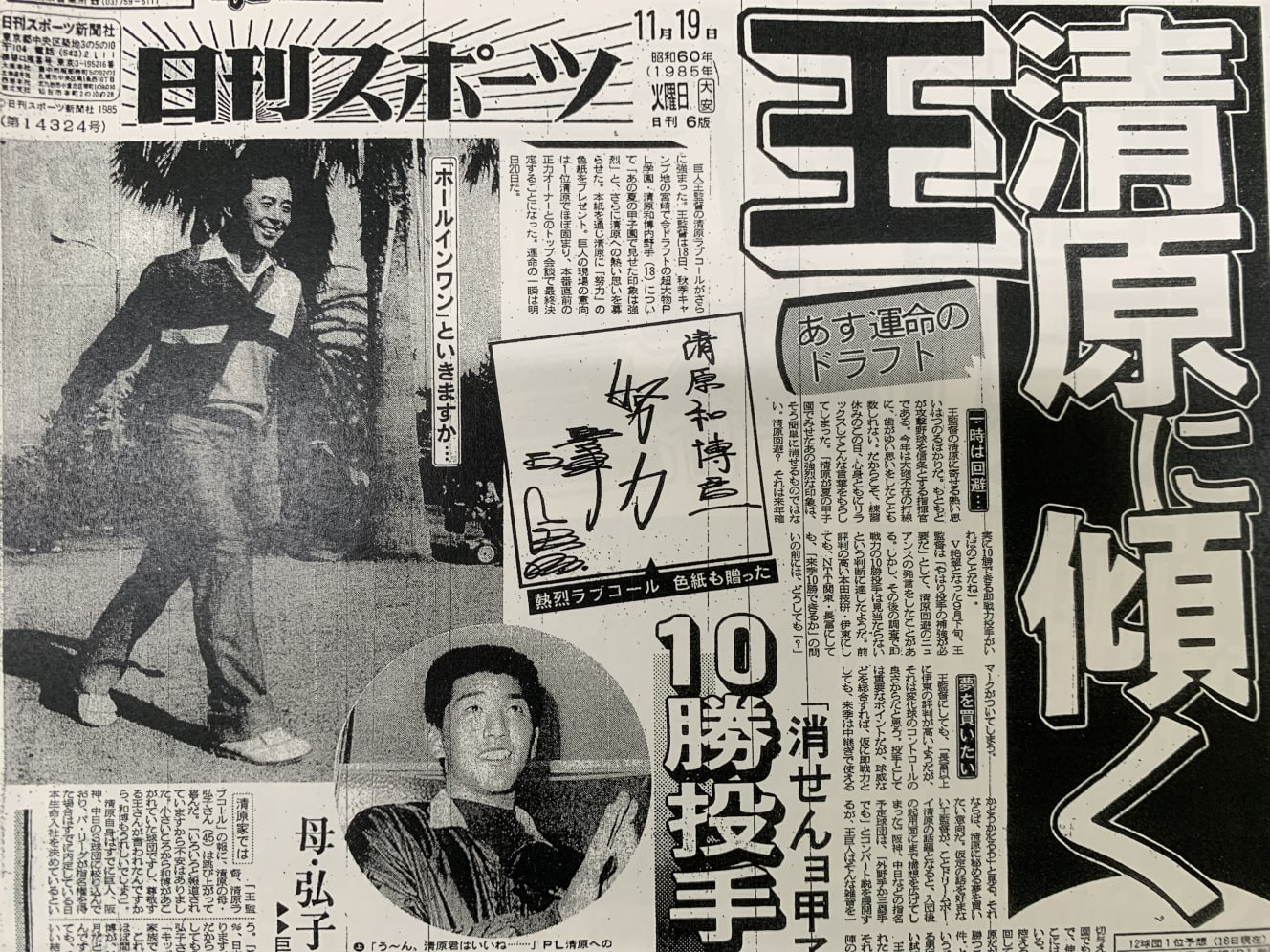
However, when you think about it calmly, there was a team situation that forced the Giants to select Kuwata: The Giants were competing with Hanshin and Hiroshima, who had won the 1985 championship, for the top spot until August, but thereafter, the pitching staff was rattled by the departure of Hiroki Makihara and the poor performances of Taku Egawa and Sei Nishimoto. The Giants’ pitching staff was in a messy situation, as Shoji Sadaoka, a highly popular player, refused to be traded to Kintetsu and retired. In contrast, the hitting team ranked second in the league in both batting average and runs scored. The team’s pitching staff needed to be rebuilt quickly in order to regain its supremacy.
Kuwata was asked, “Who would turn down the Giants’ No. 1 pick?”
I went to Kuwata’s house for three days before Kuwata announced that he would give up his entrance exam to Waseda University and join the Giants. However, looking back, it felt like I had been there for about 10 days. This was because I happened to have an intense time alone with my father, Taiji, who passed away in January 2010.
Running around at night and in the morning is a basic practice for a reporter. In those days, when there was no such thing as the Internet, reporters from various companies would hang out in front of the Kuwata house, which was said to have a “secret agreement with the Giants,” until 1:00 a.m., the last deadline for the next morning’s newspaper. Taiji met with the press once a day for a joint interview, but he did not say much more than “I want to let Kuwata do what he wants,” as to whether he would go on to Waseda University or whether he was inclined to join the Giants.
After the deadline for the newspapers had passed, the reporters broke up at once, but I was in the vicinity of Kuwata’s house again a few hours later, between 5:00 and 6:00 a.m. I was the only other reporter there. None of the reporters were there except for me. And Taiji-san was on his way to the field where the boys’ baseball practice was held every day in the early morning hours.
In the latter half of November, when the sun finally came out and it was light enough to practice, it became my daily routine to go to the field with Taiji.
On November 21, when I gave him my business card and said hello, he said nothing. The next day, November 22, he hardly spoke to me. During the day, Kuwata had a meeting at PL Gakuen with manager Junji Nakamura and the head of the baseball department, and it was decided that he would take the entrance examination for Waseda University and give up his plans to join the Giants, which was reported in the newspaper on the following day.
Did he decide to give up on joining the Giants and take the entrance examination for Waseda University? In the early morning of November 23, when the sports newspapers were all reporting the news, Taiji, who had remained mostly silent until then, spoke to me as the members of the youth baseball team were preparing for practice.
Mr. Tanigawa. I am the first of the Giants. Who in baseball would turn down the Giants’ No. 1 pick?”
I was puzzled and simply replied, “I don’t think so,” to which Taiji replied, “I play baseball and the Titans picked me first. Would you refuse?” He continued again. At that point, Kuwata had not yet expressed his decision whether to go to Waseda University or negotiate with the Giants. I was convinced, ‘This is the answer.
If it were today, when readers flock to breaking news on the Internet, it might have been a scoop. But, alas, it was not to be. That was because, on the very evening of the day I interviewed Taiji, Kuwata announced his decision not to enter Waseda University.
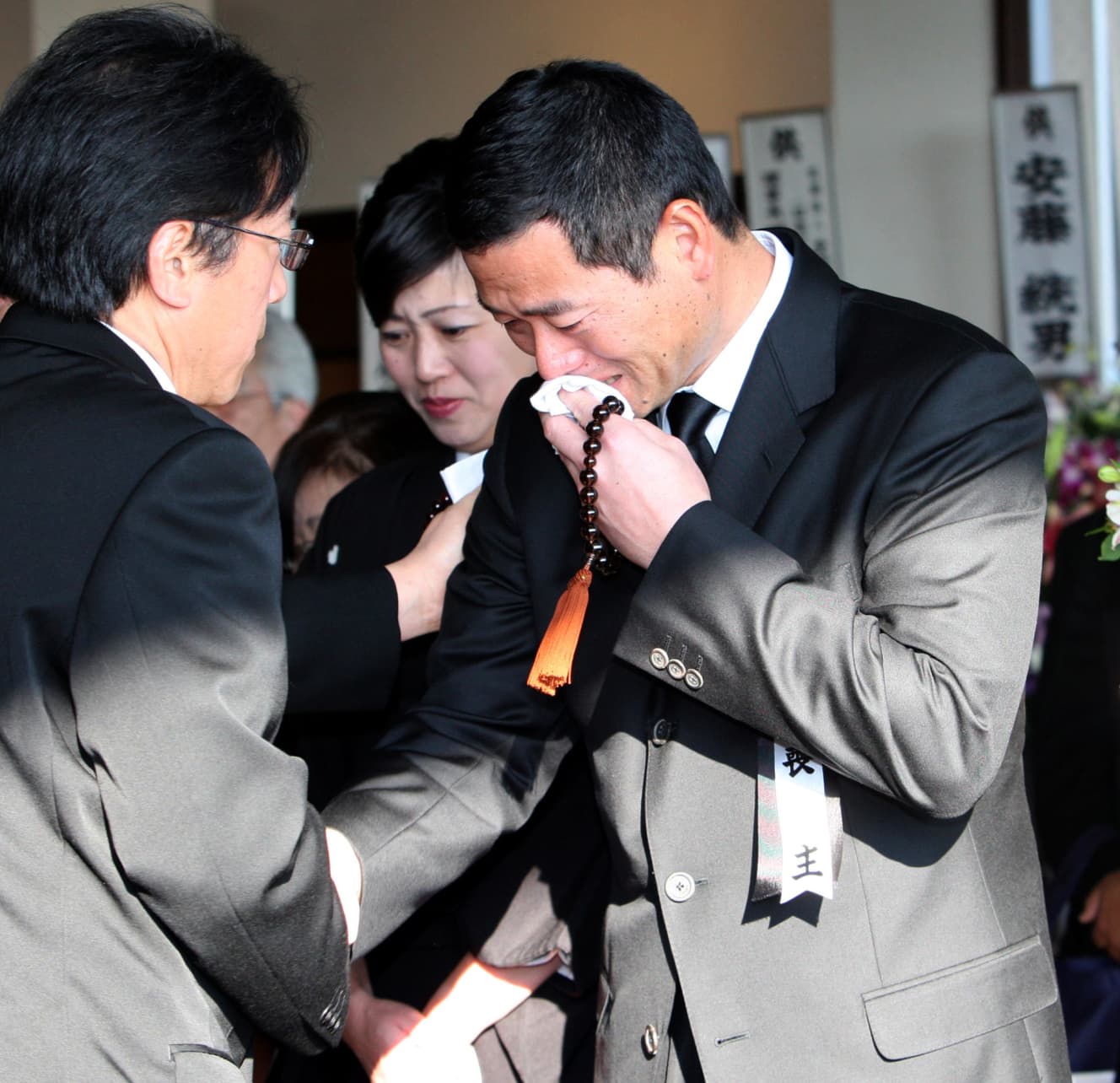
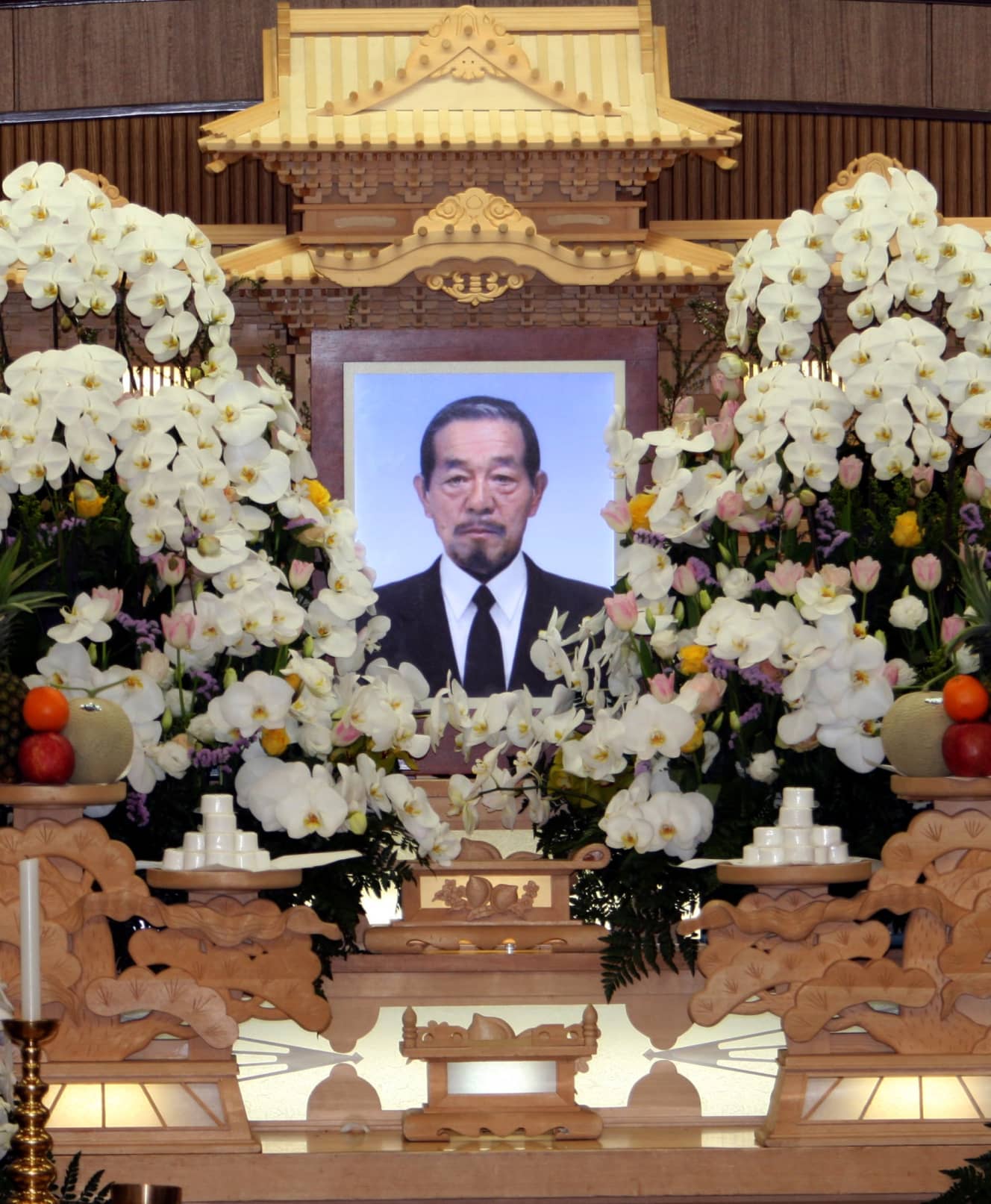
The following day, November 24, Daily Sports reported the following exchange between Kuwata and the press
–How are you feeling now, Mr. Kuwata?
I have fulfilled my original intention. I decided that if the Giants were the top team, I would go, and if not, I would go to Waseda.
–What do you mean that you have been saying that you are going on to higher education and higher education?
Seibu, Yakult, and others were also mentioned in the newspapers as candidates, and I didn’t think the Giants would be the only ones to pick me.
–Are you saying that he was openly lying?
If you think so, you may think so. You didn’t say you wouldn’t go for it. You asked me what I would do if the Giants picked me first, and I told you that it would be Mr. Kiyohara.
(omitted).
–How did you get along with Mr. Kiyohara?
We have been together for three years, and we are not bad friends. We talk and play together at school.
–What did your family say to you?
My family told me to make my own decision in the end. My parents know this.
–Why didn’t he pick the Giants?
I don’t know…
Kiyohara, who had been given a handwritten note from manager Oh with the word “effort” written on it through the paper, was able to say without hesitation, “I want to be nominated by the Giants,” but Kuwata, who was talked about as if going to Waseda University was a given, had not even submitted his resignation notice, so naturally, Kuwata had no opportunity to make contact with the press. Kuwata’s true feelings deep in his heart did not have a chance to be made public.
Regardless of the “secret agreement” as it was called, the top value of Taiji, who loved baseball and was genuinely devoted to the game, was to be “No. 1 of the Giants. I believe that Kuwata chose his career path honestly based on his feelings.
In the long history of the draft, which spans more than half a century, only Shuichi Kobayashi, a graduate of Aichi Gakuin University, was selected first overall by the Giants in 1973 but did not join the team. Later, Daisuke Motoki, an infielder, and Tomoyuki Sugano, a pitcher selected by a team other than the Giants, joined the Giants after serving as ronin, and even though it has become common to see Shohei Otani playing a dual role in the Majors, the popularity and weight of “No. 1” of the baseball world’s allies do not seem to have changed much. I think.
As for Taiji-san, there is a later story. And because of this fact, I am convinced that there was no secret agreement between Mr. Kuwata and the Giants. One and a half years after Kuwata joined the Giants, in the summer of 1987, PL Gakuen won the Koshien Championship thanks to the efforts of Kazuyoshi Tachinami, the current manager of Chunichi, and Atsushi Kataoka, the second team manager of Chunichi. I met Taiji-san, who was there as a parent of Kuwata’s younger brother, Izumi, who was on the bench. Taiji-san remembered me clearly.
He said, “How nice of you to come. The Giants’ first place was good enough for me.
I was a little concerned that he might be wary of the press, including me, because of the “secret agreement” between Taiji and the Giants that had not been dispelled by the public. However, my fears were dispelled the moment our eyes met and I saw Taiji’s carefree smile.
I wondered what he meant when he said, “I am glad I did that. Kuwata’s first year with the Giants ended with only two wins, but in 1987, his second year with the team, he showed consistent performance, including his first professional complete game in July, and eventually won 15 games, helping the Giants to a league championship. As a side note, the Giants lost the Japan Series that year against Seibu, which had Kiyohara as one of its main players. Many old fans may remember the scene when Kiyohara, who was playing first base, burst into tears when Seibu was only one out away from winning the Japan Series.
Taiji was killed in a fire in 2010. Until that time, however, he had organized and taught his own youth baseball team in Hamamatsu City, Shizuoka Prefecture. For Taiji, who was obsessed with baseball and chased the white ball with his boys, the Giants were the pinnacle of baseball at that time. He probably could not “lie” about the weight and gratitude of being nominated by the Giants’ top baseball team. Is the theory that there was no secret agreement, which I still hold in my heart 37 years later, wrong?
This year, too, many promising high school players are expected to be nominated, including Shogo Asano of Takamatsu Commercial, who is said to have super high school-class power despite his lack of height (171 cm), and Shion Matsuo of Osaka Kirikage, who is rapidly gaining attention as a “hard-hitting catcher” after his success at the Koshien. He is expected to be nominated. Regardless of which team they end up going to, we hope that the draft will be such that their future baseball careers will be glorious. (Honorifics omitted in the text)
Kazuhiro Kiyohara immediately after the draft meeting (Photo: Kyodo News)
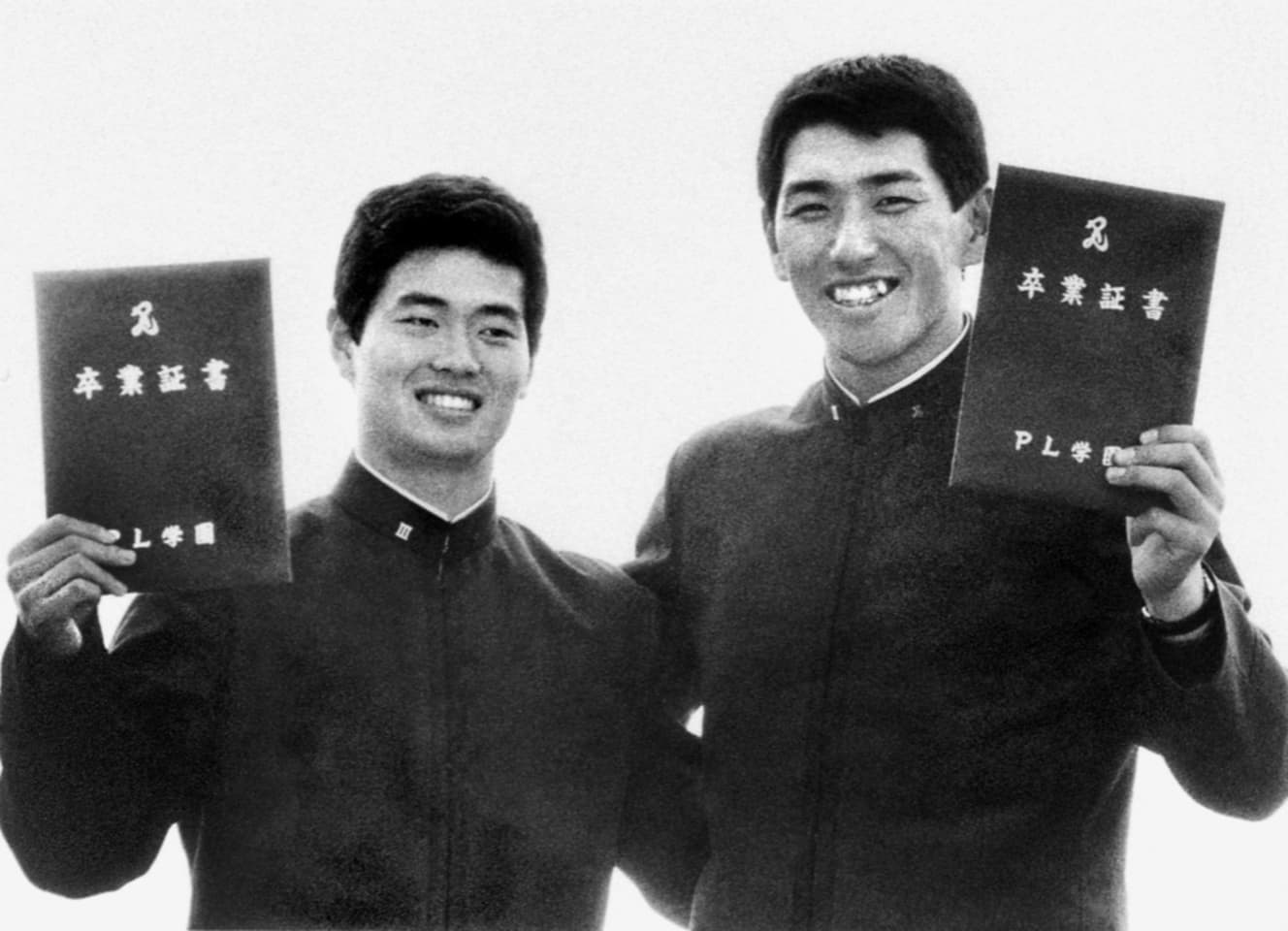
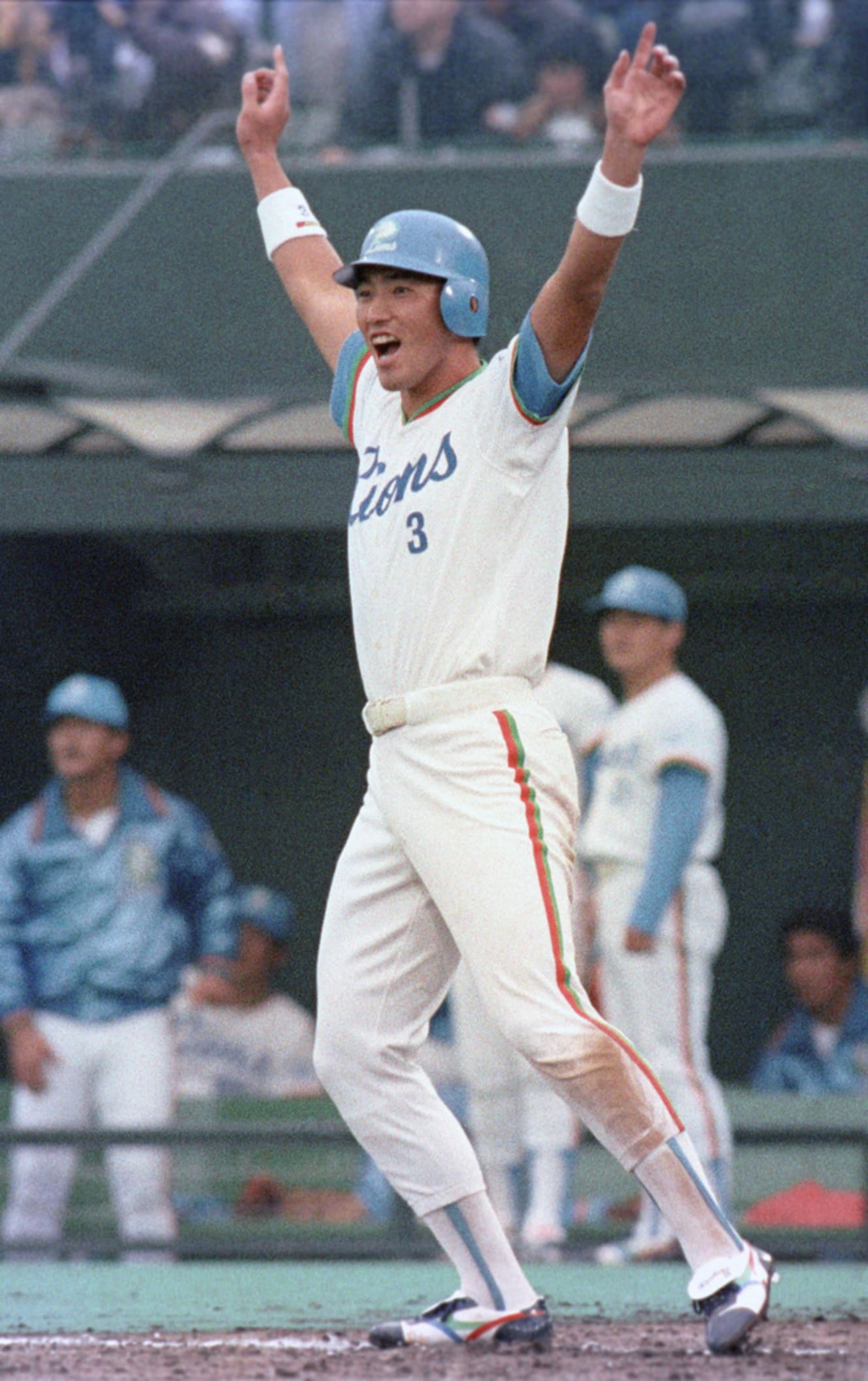
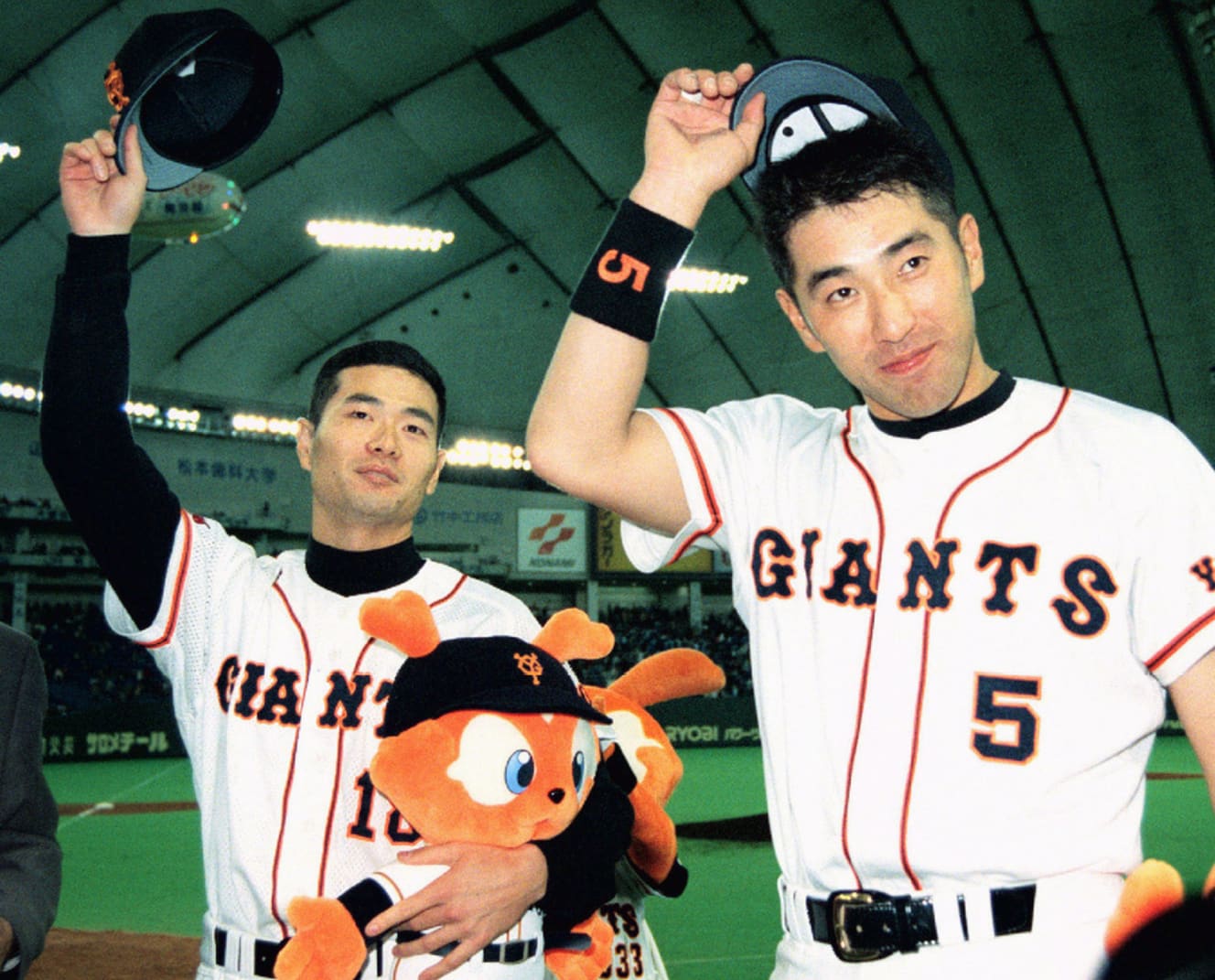
Reporting and writing: Toshinori Tanikawa
Former reporter for Daily Sports News and Jiji Press
